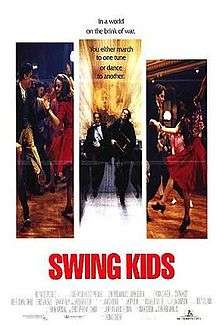Swing Kids (film)
| Swing Kids | |
|---|---|
 Theatrical release poster | |
| Directed by | Thomas Carter |
| Produced by |
Mark Gordon John Bard Manulis |
| Written by | Jonathan Marc Feldman |
| Starring | |
| Music by | James Horner |
| Cinematography | Jerzy Zielinski |
| Edited by | Michael R. Miller |
Production company | |
| Distributed by | Buena Vista Pictures |
Release dates | March 5, 1993 |
Running time | 114 minutes |
| Country | United States |
| Language | English |
| Budget | $19 million |
| Box office | $5,632,086 |
Swing Kids is a 1993 American drama directed by Thomas Carter, and stars Christian Bale, Robert Sean Leonard and Frank Whaley. In pre-World War II Germany, two high school students, Peter Müller and Thomas Berger, attempt to be swing kids by night and Hitler Youth by day, a decision that acutely impacts their friends and families. The film received mostly negative reviews.
Plot
In Hamburg in 1939, Peter Müller and Thomas Berger join their friends Arvid and Otto at a swing club called the Bismarck. They have a good time, dancing and enjoying the music.
Peter goes home to find his mother in an argument with a Nazi officer. Herr Knopp, head of the local Gestapo, arrives and curtly dismisses the officer. Herr Knopp begins asking Frau Müller questions about some of her late husband's friends. Herr Müller had been accused of being a communist, and was irreparably damaged by an interrogation at the hands of Nazi agents.
At Arvid's house, Thomas accidentally ruins one of Arvid's prized records. Upset, Arvid kicks Thomas, Peter and Otto out. To apologize to Arvid, Peter and Thomas steal a radio (which Peter knows was stolen from a ransacked Jewish home) from a bakery. Thomas escapes, but Peter is caught. Herr Knopp, who is attracted to Peter's mother, intercedes for him; in return, Peter must enroll in the Hitlerjugend (HJ).
Peter, who has a job delivering books, is asked to spy on his boss, whom the Nazis suspect is working against the Reich. In HJ school, the boys are encouraged to spy on their friends and families. Thomas accuses his father of insulting Hitler, hoping to cause trouble for him, but is unnerved when the Nazis come to his home and take his father away. His subsequent attempts to resume his friendship with Peter and persuade him to collaborate with the Nazis are tinged with fear.
Arvid, who is working at a jazz club, refuses to play a German song, lashing out at the club's patrons for being blind to the Nazi agenda. Peter is sympathetic but Thomas loudly argues the Nazi side. Peter angrily proclaims Thomas to be a "fucking Nazi" and storms off. As time goes on, Arvid realizes there is nothing for him in Germany and commits suicide.
As Thomas begins to believe fully in Nazi ideology, Peter feels as though there is no hope for him. Peter, disenchanted with how his life is coming apart, dresses up and goes to a swing club which is scheduled to be raided by members of the Hitlerjugend (HJ). As Thomas begins assaulting the club's patrons he attacks Peter; however, during the fight Peter is able to reach Thomas. Thomas begs Peter to run away but Peter won't. Willie is there and as Peter is driven away by the police he loudly screams "Swing Heil!" over and over again, proud that his brother stood up for being a swing kid.
Cast
- Robert Sean Leonard as Peter Müller
- Christian Bale as Thomas Berger
- Frank Whaley as Arvid
- Barbara Hershey as Frau Müller
- Tushka Bergen as Evey
- David Tom as Willi Müller
- Julia Stemberger as Frau Linge
- Kenneth Branagh as SS-Sturmbannführer Knopp
- Noah Wyle as Emil Lutz
- Jessica Hynes as Helga
- Martin Clunes as Bannführer
- Jayce Bartok as Otto
Soundtrack
The soundtrack includes a combination of swing music and the film's score.
1."Sing, Sing, Sing (With a Swing)" – 5:05
2."Nothing to Report" – 1:37
3."Shout and Feel It" – 2:27
4."It Don't Mean A Thing (If It Ain't Got That Swing)" – 2:51
5."The Letter" – 4:12
6."Flat Foot Floogee" – 3:20
7."Arvid Beaten" – 2:12
8."Swingtime in the Rockies" – 3:10
9."Daphne" – 1:52
10."Training for Utopia" – 3:45
11."Life Goes to a Party/Jumpin' at the Woodside" – 2:17
12."Goodnight, My Love" – 3:08
13."Ashes" – 4:21
14."Bei Mir Bist Du Schön" – 4:11
15."The Bismarck" – 3:06
16."Swing Heil″ – 5:28
Reception
The film received generally unfavorable reviews from critics. Review-aggregation website Rotten Tomatoes gives it a score of 38% (based on 13 reviews), with an average score of 4.6/10.[1] Jonathan Rosenbaum of Chicago Reader described the film as a "corny but sincere weeper", while Roger Ebert of the Chicago Sun-Times gave the film one star (out of 4) and criticized the screenplay (calling it "murky"[2][3] and including it on his "Most Hated" list).[4] On Metacritic, which assigns a weighted mean rating out of 100 reviews from film critics, the film has a rating score of 39 (based on 20 reviews).[5]
References
- ↑ "Swing Kids". Rotten Tomatoes. Retrieved 2012-07-24.
- ↑ Rosenbaum, Jonathan. "Swing Kids". Chicago Reader. Retrieved 2012-07-24.
- ↑ "Swing Kids :: rogerebert.com :: Reviews". Rogerebert.suntimes.com. 1993-03-05. Retrieved 2012-07-24.
- ↑ "Ebert's Most Hated :: rogerebert.com :: News & comment". Rogerebert.suntimes.com. Retrieved 2012-07-24.
- ↑ "Swing Kids Reviews, Ratings, Credits, and More". Metacritic. Retrieved 2012-07-24.